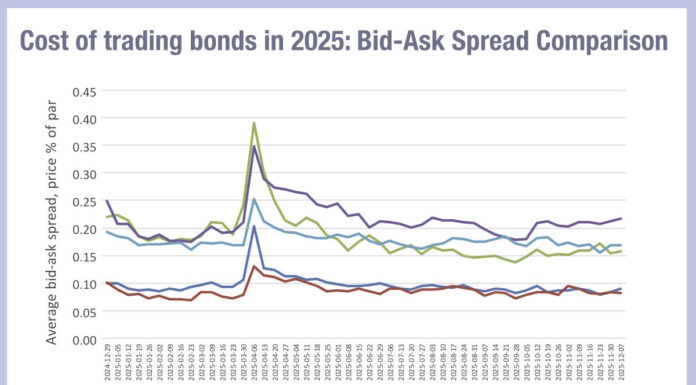A paper by the European Central Bank (ECB), entitled ‘Dark pools in European equity markets: emergence, competition and implications’ has advised firms to be aware of the impact that dark pools in non-equity assets may have on market stability and practice.
Although most fixed income trading is currently conducted without pre-trade display of prices and orders, trading process will change in the new Markets in Financial Instruments Directive (MiFID II) and Regulation (MiFIR).
“Understanding the impact of dark pools on market stability is of particular relevance given the upcoming regulatory changes under MiFID II/MiFIR, which extend uniform pre- and post-transparency requirements for trading to additional financial instruments, including fixed income,” wrote the report authors, Monica Petrescu and Michael Wedow of the European Central Bank.
They continued, “These changes entail the possibility that dark pools will be used for additional instruments, including in secondary fixed-income markets, which have been identified as a primary concern for financial stability. Understanding the effects of such a structural shift in trading on market functioning can help anticipate potential effects on liquidity and volatility in these markets.”
The shift from almost entirely dark trading at present to a requirement for pre-trade transparency for some fixed income instruments from 3 January 2018 will coincide with the need for asset managers’ best execution policies to be extended into fixed income trading.
Constantinos Antoniades, head of Fixed Income at block trading specialist Liquidnet, says, “What we hear from our members is that the new best ex policy, coming in the world of MiFID II, will include the additional practice of looking for electronic liquidity in places like dark pools, because there you can access natural, opposite liquidity.”
He notes that while the regulations are about establishing policy and process rather than determining behaviour on a trade-by-trade basis, authorities are likely to check that processes are being complied with, in order to determine compliance.
“Now dark pools are not just part of the execution system, but actually an integral part of the best execution policy,” he says. “And this is a big change from today, where we are now.”
The ECB authors went on to warn that while dark pools may be “better able to cater to fixed-income instrument trading” based on the large ticket sizes and infrequency of trading that characterises many fixed income instruments, “the continued coexistence of many dark pools in the equity space could suggest that dark pools may also cement market fragmentation for fixed income, affecting the price discovery process and, thus, market liquidity.”
©Markets Media Europe 2025













